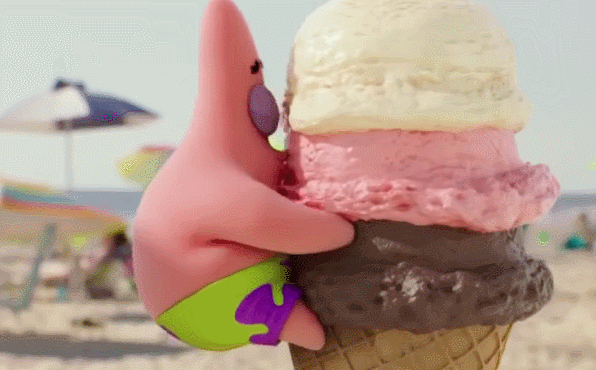You all know of the perishable food item widely known as ice cream, yes? If so, you likely have become deeply dependent upon the notion that every human being must *like* the stuff.
I am here to inform you that this is not the case.
As one member of the ice-cream-enjoyment-deficient minority, I can speak of the ways in which those of us who prefer our dessert in a solid, non-frozen form are treated by the majority.
You may now be thinking, "wow, she's getting weirdly intense about this, no one cares if you like ice cream or not." Well, dear naysayer, I am living proof that this is not the case. Nye on every day, I am faced with the palpitating question of, would I like some ice cream? Because it is such a beautiful day and everyone likes ice cream! It is then that I come barreling into their puny perfect worlds and smash their tried and true ideals of the human condition pertaining to cold, sweet things.
Every person I encounter has had a different reaction. Some become defensive as if my disliking ice cream is telling them they're fat. Some actually question the validity of my friendship; and by actually, I mean not actually. Many a person has walked away speechless from such a conversation with me. It's as if they're brain-frozen minds can't grasp the fact that someone might literally just not like the way it tastes.
It is my mission in this here article to address the 5 stages of accepting a person like me, someone whose taste buds are simply different from yours. These points may look like the stages of grieving, but I'm pretty sure they were definitely created in order to help someone who is sorbetly impaired. Because everything is about me.
1. Denial:
Many of the people I work with (also known as friends and randos who want ice cream) are immediately taken aback by my dislike for something that their world revolves around. They simply cannot and will not believe that I am not like them. The "are you serious?" comes first. Like, no Dana, I just thought I'd ~pull your ear~ by randomly saying I dislike ice cream - a topic which is neither to be joked nor trifled with.
They quickly change their tune and decide to ask "have you ever tried it before?" Do people really say that they straight up do not like something before having tried it? That seems a bit strange, and I'm thinking they could have figured that out themselves, but I play along to respect their process through the 5 steps.
2. Anger:

One young man actually told me I was vain for not liking ice cream. He, admittedly, was a cross-faded street urchin, but I left that interaction feeling confused. Why might someone think this of me? Have my taste buds assaulted you? Did I tell you to stop eating ice cream? Am I carrying a tiny pink mirror around and forcing you to take my autograph because I clearly look SO good that my not eating ice cream causes me to be this beautiful. No, all I did was decline your offer of ice cream (which, side note, was creepy and germy).
3. Bargaining:
These ~clientele~ of mine then begin to come up with an alternate reasoning or option for me to take. As if they're asking for divine providence to save my soul from burning in hell without the sweet relief of ice cream. In a last-ditch effort, they tell me to try Dip n Dots! They tell me gelato is actually much better! Perhaps a milkshake would be more to my fancy? Or a sundae! What if I just put extra toppings on it? Root beer float, banana split, sandwich form, you name it - I've been told to try it. As if ice cream in a different form would be the universal panacea to this aching need in my heart for gelatinous cold sludge that I am somehow unaware of.
4. Depression:
I promise, I know that depression is no joking matter, so let's just clarify this step to say that the folks involved in these interactions exhibit signs of depressed affect, not the diagnosed disorder. As an alternate label, I would dub this stage the "confused and questioning" trope. In this period, those who are my friends will inevitably recognize that they cannot be friends with me anymore. Many will question if am, in fact, human. Several have asked "you STILL don't like it?" which at least recognizes that they are aware of my dislike for ice cream, and apparently my ability to learn from my mistakes. They say this so dejectedly with just enough hope that I almost feel compelled to give some non-committal "yeah, I guess, maybe a little" and to nonsequitur my way out of there.
5. Acceptance:

The final, sought-after stage starts with seeking knowledge. The average person will ask what I don't like about it, in an effort to understand. Once explained, they may ask what I DO like, or as it is commonly phrased, "what do you do for fun?" This may imply that a person's only source of true fun is through desserts, but I am alright with this (I mean, this stage IS called acceptance). They will then mention that I am "so lucky," which I assume is a reference to my not eating those calories, which I am quickly able to assure them I make up for in bread alone.
So there you have it, the conclusive process of coming to accept your friend or colleague's inability to align with your preferences. But like, ice cream, not politics.

























